|
|
|
Sort Order |
|
|
|
Items / Page
|
|
|
|
|
|
|
| Srl | Item |
| 1 |
ID:
125283
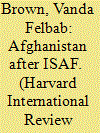

|
|
|
|
|
| Publication |
2013.
|
| Summary/Abstract |
Summer 2013 brought one of the most violent fighting seasons in Afghanistan since the US military and state-building effort began in 2001. On the cusp of the momentous 2014 presidential elections and a year before the majority of international coalition forces would depart from the country in the midst of transferring security functions to the coalition-supported Afghan National Security Forces (ANSF), the Taliban is dug in and still ferocious. It is testing the Afghan security forces, which since June 2013 are supposed to be taking the lead in providing security throughout the country while international forces are increasingly disengaging from combat and departing Afghanistan.
|
|
|
|
|
|
|
|
|
|
|
|
|
|
|
|
| 2 |
ID:
125281
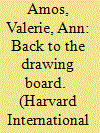

|
|
|
|
|
| Publication |
2013.
|
| Summary/Abstract |
Disasters are not only increasing in number, they are becoming more complex as natural and man-made crises combine to cause mega-disasters. Rapid urbanization, population growth, political unrest, and migration have created fragile environments in many countries, and boundaries are blurring between complex emergencies and chronic vulnerability in places such as the Democratic Republic of the Congo and Somalia. These factors have resulted in intense pressure on the UN's humanitarian organizations and partners to respond more quickly when disaster strikes and to be more effective in its response.
|
|
|
|
|
|
|
|
|
|
|
|
|
|
|
|
| 3 |
ID:
125285
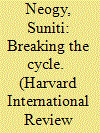

|
|
|
|
|
| Publication |
2013.
|
| Summary/Abstract |
It happens all the time, but it still surprises me when I hear the women I work with in India's rural villages discuss violence and forced sex with disconcerting nonchalance. They say things like, "if I don't cook well, can't take care of the children well or refuse sex, I will have to face a beating. In these villages, living in a violent home is so commonplace that to live without violence is described as a supernatural occurrence. Of the women who don't face violence, others will say, "Yes, a few have very good kismet or destiny."
|
|
|
|
|
|
|
|
|
|
|
|
|
|
|
|
| 4 |
ID:
125317
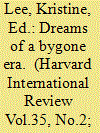

|
|
|
|
|
| Publication |
2013.
|
| Summary/Abstract |
In August of 1963, the United States was swept up in unprecedented mass mobilization. Two hundred thousand Americans--black, white, rich, and poor from across the nation--poured into the National Mall in Washington, D.C. armed with picket signs, freedom songs, and a fervent dedication to the light for equality before the law. The March on Washington for Jobs and Freedom, the venue at which Martin Luther King Jr. uttered his lamed "I have a dream" incantation, was a watershed moment in the long and tumultuous civil rights struggle in the United States. It set' forth new genre of civil rights activism and became a template for subsequent generations of political protest around the globe. Indeed, over the course of the ensuing decade, university students in France aligned themselves with trade union workers to subvert the Gaullist regime, the military dictatorship in Brazil struggled to withstand the escalating guerilla warfare leveled against it, and opposition to the Vietnam War simmered across the United States, London, Paris, Berlin, and Rome..
|
|
|
|
|
|
|
|
|
|
|
|
|
|
|
|
| 5 |
ID:
125277
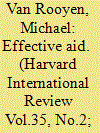

|
|
|
|
|
| Publication |
2013.
|
| Summary/Abstract |
Humanitarian assistance is aimed at providing rapid, life-saving support in settings of high population vulnerability, such as in times of war, disaster, or displacement. The provision of humanitarian assistance is complicated by severe access restrictions, large-scale emergency needs, displaced populations, and complex political and social settings. Both war and disasters create, and often amplify, existing economic disparities and contribute to an environment in which gender inequities, human vulnerabilities, and human rights abuses are likely to be exacerbated. The emergency response to large-scale humanitarian emergencies such as the 2010 earthquake in Haiti creates a sense of public urgency and political pressure to intervene. The last decade has seen significant advances in the standardization and coordination of relief and development activities, including improved mechanisms for coordination and accountability. While these efforts provided a solid basis for improved efficiency, they have faltered in recent large-scale crises. As the global relief and development community contemplates the next decades of humanitarian operations, a few essential questions should be raised: What are the most important barriers to providing effective aid? What future issues must be understood to optimize the efficiency of aid? What is the cost of inaction and what are the ramifications of not changing the system? This article will focus on some of the factors contributing to ineffective humanitarian aid and discuss the progress toward humanitarian reform, including the need for professionalism, coordination, and accountability.
|
|
|
|
|
|
|
|
|
|
|
|
|
|
|
|
| 6 |
ID:
125309
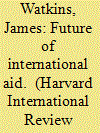

|
|
|
|
|
| Publication |
2013.
|
| Summary/Abstract |
By 2015, we will have nearly eradicated extreme poverty and hanger throughout the world by halving the proportion of people living on under $1.25 per day. We will have achieved universal primary education worldwide, reduced child mortality rates by two thirds, and halted and reversed the spread of HIV/AIDS, malaria and other diseases. We will have promoted gender equality, improved maternal health, and ensured environmental sustainability. Or at least, this is the promise that we made to ourselves, and to each other, almost 15 years ago.
|
|
|
|
|
|
|
|
|
|
|
|
|
|
|
|
| 7 |
ID:
125286
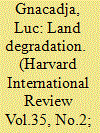

|
|
|
|
|
| Publication |
2013.
|
| Summary/Abstract |
Last year, the world met its Millennium Development Goal of halving the number of people without access to safe drinking water, five years ahead the 2015 deadline. However, 11 percent of the world' population, or 783 million people, still live without access to safe drinking water, 40 percent of them in sub-Saharan Africa.
|
|
|
|
|
|
|
|
|
|
|
|
|
|
|
|
| 8 |
ID:
125282
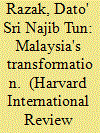

|
|
|
|
|
| Publication |
2013.
|
| Summary/Abstract |
Malaysia has one overarching and transformative policy objective: to achieve high income and developed nation status by the year 2020. High income nations, as defined by the World Bank, are those with a gross national income per capita of US$12,480 or more in 2011. Malaysia's per capita income now stands close to US$10,000 and the aim is to increase it to US$15,000 by 2020. My view is that developed nations should also meet a number of other important benchmarks. For instance, a nation's wealth must be reasonably distributed, not concentrated in the hands of the elite; physical and social infrastructure must be robust; and, most importantly, a developed country should be democratic and respect basic freedoms.
|
|
|
|
|
|
|
|
|
|
|
|
|
|
|
|
| 9 |
ID:
125306
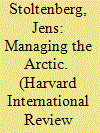

|
|
|
|
|
| Publication |
2013.
|
| Summary/Abstract |
To most people the Arctic is a distant realm, almost another world, inhabited by polar bears. They may even think the frigid landmasses and icy seas of the Arctic are irrelevant to daily life further south. However, the Arctic is changing rapidly. The melting of the sea ice has thrust the region into the global spotlight as world leaders seek to assess both the environmental threats and economic opportunities of a smaller northern ice cap. Norwegians have long balanced a fierce commitment to environmental protection with our substantial Arctic economic interests, and we are eager to help devise responses to the worrying changes we have all observed. The Arctic encompasses more than 15 million square miles or about 8 percent of the surface of the Earth, equivalent to four times the extent of U.S. territory. But the human residents of this vast area number only about 4 million, and are spread across eight countries - Norway, Russia, the United States, Canada, Finland, Sweden, Iceland and Denmark.
|
|
|
|
|
|
|
|
|
|
|
|
|
|
|
|
| 10 |
ID:
125284
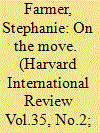

|
|
|
|
|
| Publication |
2013.
|
| Summary/Abstract |
The possibilities for constructing environmentally sustainable public transit infrastructure in the United States are strongly shaped by the logic and policies of neoliberalism. In brief, neoliberal ideology advocates for the extension of market-based principles in the arena of the state in order to "liberate" both public services from so-called state inefficiencies and capital "squandered" by taxation that could be more profitably deployed by private actors. Accordingly, neoliberal governance frameworks promote fiscal austerity and market discipline over the state.
Farmer, Stephanie
|
|
|
|
|
|
|
|
|
|
|
|
|
|
|
|
| 11 |
ID:
125303
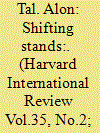

|
|
|
|
|
| Publication |
2013.
|
| Summary/Abstract |
While the Middle East is frequently in the news because of political volatility and violence, there is an underlying lack of environmental equilibrium that poses a comparable threat to regional stability. Israel's neighbors--Egypt, Jordan, and Palestine--are arid countries with limited natural carrying capacity and burgeoning populations. Providing food and employment in what were traditionally agrarian economies has contributed to significant depletion of soil and water resources. Israel's experience as an innovator in technologically intensive dryland agriculture and forestry is entirely different. Yet it is not clear whether the grand Israeli experiment in water management and combating of desertification offers a compelling alternative model to its neighbors should diplomatic breakthroughs pave the way for transboundary cooperation. Not only are the socioeconomic and cultural circumstances entirely different, but the sustainability of some of Israel's unique management practices remains questionable.
|
|
|
|
|
|
|
|
|
|
|
|
|
|
|
|
| 12 |
ID:
125280
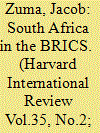

|
|
|
|
|
| Publication |
2013.
|
| Summary/Abstract |
South Africa will celebrate its 20 years of democratic rule next year, following the demise of apartheid in 1994. The ruling African National Congress (ANC), which is also the oldest liberation movement on the continent, celebrated its 100th anniversary last year. As its core statement of principles, the "Freedom Charter" was adopted in Kliptown on June 26, 1955. It declared that "There shall be Peace and Friendship" and projected that South Africa shall be a fully independent state that respects the rights and sovereignty of all nations, strives to maintain world peace and the settlement of all international disputes by negotiation - not war, and calls for peace and friendship amongst all our people secured by upholding the equal rights, opportunities and status of all.
|
|
|
|
|
|
|
|
|
|
|
|
|
|
|
|
| 13 |
ID:
125297
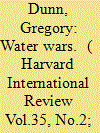

|
|
|
|
|
| Publication |
2013.
|
| Summary/Abstract |
Water seems an unlikely cause of war, but many commentators believe it could define 21st Century conflict. A February 2013 article in U.S. News and World Report warns that "the water-war surprises will come", and laments that "traditional statesmanship will only take us so far in heading off water wars". A 2012 article in Al Jazeera notes that "strategists from Israel to Central Asia" are preparing for strife caused by water conflict. Even the United States National Intelligence Estimate predicts wars over water within ten years. Their concern is understandable--humanity needs fresh water to live, but a rise in population coupled with a fall in available resources would seem to be a perfect catalyst for conflict. This thinking, although intuitively appealing, has little basis in reality--humans have contested water supplies for ages, but disputes over water tend to be resolved via cooperation, rather than conflict. Water conflict, rather than being a disturbing future source of conflict, is instead a study in the prevention of conflict through negotiation and agreement.
|
|
|
|
|
|
|
|
|
|
|
|
|
|
|
|
| 14 |
ID:
125313
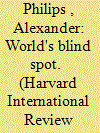

|
|
|
|
|
| Publication |
2013.
|
| Summary/Abstract |
Children starve. Young girls sell their bodies to eat. There is no clean drinking water. There are no doctors. Refugees are not allowed to leave the camps. As the rainy season approaches, waterborne diseases will spread like wildfire. This is the plight of the over 200,000 Rohingya who survive in makeshift refugee camps along the Myanmar's border with Bangladesh. Although their situation is dire, they are better off than the Rohingya being slaughtered back in Myanmar. According to the United Nations, the Rohingya are the world's most ignored and persecuted minority. They have faced decades of neglect and dehumanization while the world stands by; it is time for the response of the international community to change. The situation in Myanmar has reached a tipping point and the country is a tinderbox, ready to ignite into violence. The inaction of the international community has allowed the persecution of the Rohingya Muslim minority to escalate into state-sponsored ethnic cleansing and a spreading humanitarian crisis in Myanmar's western Rakhine state
|
|
|
|
|
|
|
|
|
|
|
|
|
|
|
|
|
|
|
|
|